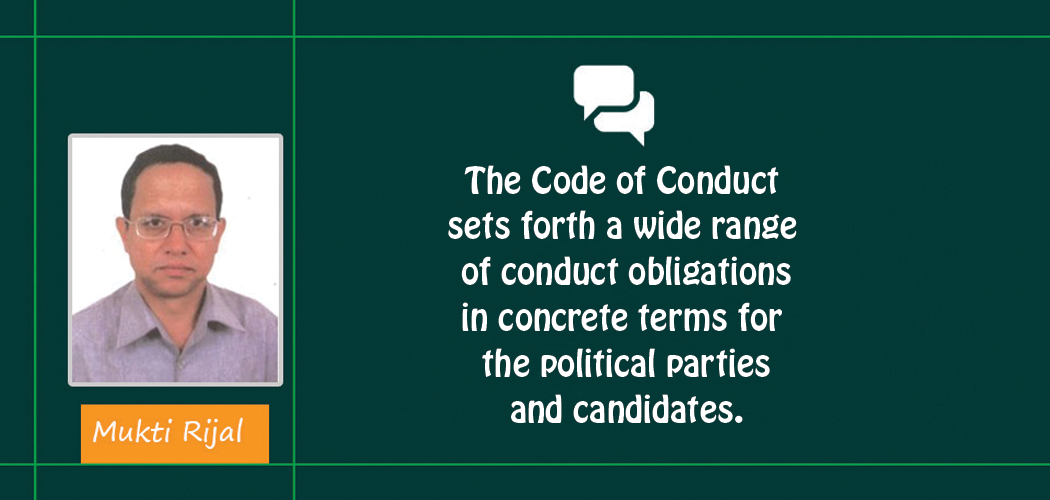- Thursday, 19 February 2026
EC’s Push For Electoral Reform
Mukti Rijal
As a first step to this end, the EC took bold a decision to require that the incumbent local government mayors, chairpersons, deputies, executive and assembly members seeking re-election need to tender their resignation from the respective posts and come clean before they file nomination to compete the polls. This requirement is provided in Section 13 of the Local Elections Act which makes it mandatory for them to resign for a reason of the fact, among others, that they draw perks and remunerations in a regular manner from the public exchequer. Though the EC’s directive was challenged in the court of law, the judicial decision upheld the election body's measure to make local democratic exercise an even playing field.
Directive
Furthermore, the election body took another important step through a directive in requiring the candidates to settle the arrears taken in advance for different purposes from the local governments and confirm that they have not been involved in any financial deals and transactions that can be questioned. According to the news reports, a big sum of resources has been recovered from the concerned with the implementation of this measure taken by the Commission. The EC has time and again reminded the political parties to respect and honour the constitutional and legal provision relating to diversity, equity and inclusion and maintain priority to choose women as candidates at different levels and capacity at the local level for enhancing representation of women in politics.
Going by the stances taken by the EC during these days, it appears that election management body has been active to pull up and take on the political parties and their leaders to defend and enhance the integrity and propriety of the elections. The EC called upon the political parties, the other day, not to exert undue pressure on candidates to withdraw from the race even if it would undermine the electoral prospects of one or the other contenders in the race. It has reiterated the fact that participation in the polls as voters and contesting election as candidates is the fundamental right of every citizen and this should not in no way be prejudiced. In fact, from these limited examples too, it emerges to be clear that an active and responsive EC can carry out high impact and meaningful initiatives to reform electoral process through application of the provisions contained in the existing legal arrangements.
A cursory glance over the provisions in the existing laws and code of conducts indicate that the EC is mandated to apply and enforce the provisions that can go a long way to address the issues of the campaign financing and scale down the ever growing size of the expenses in the elections campaigns. According to law, a candidate competing in the polls should operate a separate bank account dedicated to the recurring electoral expenses. All the donations and contributions need to be credited in the account. Similarly, the expenses need to be debited in the same account. This can ensure transparency and openness in the books of accounts maintained for electoral expenditures of each and every candidate. The income and expenditure statement for poll expenditure should be made public and dully reported to the EC in the prescribed format.
The Electoral Offences (Crime and Punishment) Act prohibits the candidates from resorting to the expensive and resource intensive mode of publicity and campaigning in the polls and refrain them from extravagant and pompous use of materials and vehicles. The law also prohibits the parties and candidates from using public resources, logistics and facilities for elections campaigning. Nor should public institutions and non-government organisations provide donations and contributions to political parties and candidates to support the campaign or any other purposes. The law empowers the elections officials mandated to discharge the responsibilities for conducting the polls to take actions against those found guilty of carrying out electoral offences. The Code of Conduct sets forth a wide range of conduct obligations in concrete terms for the political parties and candidates. It requires the parties and their candidates, law enforcement agencies, civil society, elections monitors and observers to abide by them.
The code prescribes the size, length and breadth of the publicity materials like posters, pamphlets extensively used for the elections campaign. Those violating the provisions enshrined in the code and the laws are liable to face consequences up to the invalidation of the results of the elections. But in order that incidences of the electoral offences are minimised and the environment for fair and free polls ensured, the role of the EC is expected to be very consistent, sustain the tempo of its determeination to cleanse the malaises ruining the electoral process.
Leadership
As a constitutional body mandated to conduct the elections for federal, provincial and local levels, it is incumbent upon the EC to act effectively to check the incidences of the electoral offences. Credit indeed goes to the dynamic and strategic leadership of the past Chief Election Commissioners like Bhoj Raj Pokharel and Neel Kantha Uprety who left their mark in conducting democratic polls successfully even during the difficult transitions. If dynamism, boldness and fearlessness shown by incumbent Chief Election Commissioner Dinesh Kumar Thapaliya is any indication, his tenure is expected to succeed in setting the milestones towards reforming the electoral process and system in the country.
(The author is presently associated with Policy Research Institute (PRI) as a senior research fellow. rijalmukti@gmail.com)
















